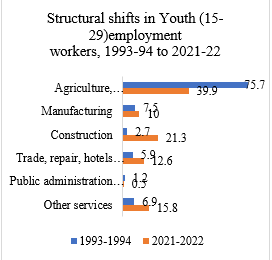Youth, Skilling and Employment
 Odisha has achieved impressive growth over the past two decades. The state’s economy exhibited a robust growth rate of 7.82 percent in 2022-23, surpassing the pre-COVID average growth of 7.1 percent from 2012-13 to 2019-20. Notably, the industry and service sectors have emerged as the primary drivers of economic expansion in recent years. Despite over half of the population being engaged in the agriculture sector, its contribution to the GDP stands at around 20 percent.
Odisha has achieved impressive growth over the past two decades. The state’s economy exhibited a robust growth rate of 7.82 percent in 2022-23, surpassing the pre-COVID average growth of 7.1 percent from 2012-13 to 2019-20. Notably, the industry and service sectors have emerged as the primary drivers of economic expansion in recent years. Despite over half of the population being engaged in the agriculture sector, its contribution to the GDP stands at around 20 percent.
The provision of decent and well-paying employment opportunities is pivotal for fostering economic growth and facilitating development. According to the World Data Atlas report in March 2023, Odisha’s labour force participation rate has decreased to 41.73% from 55.1% in 2021-22, indicating a decline in the proportion of individuals within the working age group actively engaged in the labour market. The NSDC Skill Stock report highlights that 83% of Odisha’s workforce operates in rural areas.
It is a matter of great concern that wages for workers in the primary sector in Odisha, aged 15-34 years, are 36% lower than the national average. Additionally, 33% of rural households subsist on less than INR 166 a day; 9% of rural workers face unemployment, and 4% lack access to any income, highlighting pressing economic challenges.
Demographic Transition:
Odisha boasts a predominantly youthful population, positioning it as one of the country’s youngest regions. The state is anticipated to reach the zenith of its working-age population (15-59) by 2041. The demographic distribution indicates that a substantial 65% of the population falls within the economically active age group of 15 to 59 years, with 34% categorized as youth (15-34 years). These statistics represent a significant demographic dividend, holding the potential to propel the state towards higher economic growth.
 However, this demographic dividend also poses a critical challenge, as 35% of youth lack any employment education or skill training. It is imperative to harness the potential of this young population, and equip them with demand-based skills for the job market. In doing so, the process must ensure increased participation of women and individuals from more diverse and disadvantaged groups, particularly those hailing from rural areas.
However, this demographic dividend also poses a critical challenge, as 35% of youth lack any employment education or skill training. It is imperative to harness the potential of this young population, and equip them with demand-based skills for the job market. In doing so, the process must ensure increased participation of women and individuals from more diverse and disadvantaged groups, particularly those hailing from rural areas.
It is imperative to acknowledge that there is a need to shift from conventional ‘chemical-based’ agriculture to ‘climate-resilient’ sustainable farming practices. However, preparing the agricultural ecosystem for affordable and sustainable practices necessitates targeted skilling and re-skilling within the rural community. The current need is to empower the rural youth and community-based organizations, including Self-Help Groups (SHGs), Producer Groups (PGs), Farmer Producer Organizations (FPOs), and individual entrepreneurs, to serve as influential change agents driving this transition. Additionally, the rapid growth in the renewable energy sector has resulted in skill shortages, particularly in technical roles such as solar installers and maintenance agents, as well as in more general occupations aligned with the principles of a just transition.
The theme of this year’s Youth Day was “Green Skills for Youth: Towards a Sustainable World.” If we look around, it is evident that the world is gradually shifting towards a greener, environmentally sustainable, and climate-friendly future. The success of a demographic transition towards a stronger state economy hinge on the development of agri-allied green skills.
Meanwhile, both the Central and State Governments have launched programs to support this transformation. However, the effectiveness and desired outcomes are contingent on seamless coordination among skill development entities and institutions through a multi stakeholder partnership framework.
Key Challenges:
- A study conducted by the National Skills Development Corporation (NSDC) has forecasted Odisha’s demand for skilled individuals to reach 13.5 million in the next 10 years. Presently, with a workforce of 7.5 million, the state must generate approximately 6 million skilled professionals in the coming decade to address this gap.
- The key economic drivers in any state encompass its agriculture, manufacturing, andservice sectors. The skill ecosystem involves a dynamic interplay of multiple stakeholders, including the state government, central government, non-government agencies, industry, and society, all subject to continuous change.
- The skill demand in Odisha will be substantially influenced by Industry 4.0. A recent World Bank report indicates that 69% of jobs are at risk due to advancements in automation, robotics, the Internet of Things (IoT), and Artificial Intelligence (AI). Additionally, other factors impacting skill demand include gender disparity in wage rates, a patriarchal mind set, caste discrimination, and bias against the urban poor. Notably, a discernible ‘skill caste mind set’ exists in the state, favouring specific trades or skills. Addressing this presents a challenge in ensuring the dignity of labour and equitable recognition for all skill-sets.
- There is a need to re-bridge, redesign and re-engineer the skill-building process so that the rural, tribal and agrarian population benefits from this programme.
- The decreasing labour force participation of youth is notably influenced by their heightened engagement in education and a rising attrition rate.
- A high migration rate has the potential to adversely impact agricultural improvements.
Discussion Points/ Key Issues:
- How can we promote Green Skilling and Training Opportunities in Sustainable Agriculture to foster a thriving green economy?
- Identifying gaps in current skilling practices for environmental sustainability: how can we effectively bridge these gaps?
- Shifting from ‘Classroom-Oriented Skilling’ to ‘Skilling Plus’ methodologies: implementing hands-on guidance and incubation – what are the key steps?
- Odisha, being susceptible to various climatic hazards, necessitates climate-resilient construction for sustainability. What are the prospects for climate-resilient skilling in Odisha?
- Exploring successful models from other regions or countries and adapting them to the local context is the need of the hour. How can the best practices from around the globe be contextualized in Odisha?
- What (and how) collaborative strategies or platforms can be established among relevant institutions to effectively identify and address the specific needs and aspirations of rural youth in the context of skill development and employment opportunities leading towards a green economy?
- What strategies and support mechanisms are required to encourage and empower more youth to venture into entrepreneurship across various sectors, ensuring their success and bolstering their contribution to the advancement of the local economy?
Speaker / Paneslists
Dr. Balakrushna Padhi
 Dr. Balakrushna Padhi is currently working as an Assistant Professor in the Department of Economics and Finance, Birla Institute of Technology and Science (BITS), Pilani Campus, Rajasthan. Apart from his current assignment he has also worked in various capacities (Economist, Research Assistant and Consultant) in national level institutions like, CEFT (Bhubaneswar); IIM (Indore); CDS (Trivandrum); IEG (New Delhi); ISID (New Delhi). His research interest includes: employment, informality and labour migration; and issues related to poverty, inequality and health¸ social sector budgeting. His teaching interest topics include Public finance, Principles of Economics, Microeconomics and Business environment. He has completed his PhD from Centre for the Study of Regional Development (CSRD), Jawaharlal Nehru University, New Delhi. Prior to this he has completed his MPhil. in Applied Economics at Centre for Development Studies (CDS), Trivandrum, Kerala and Masters in economics from Sambalpur University, Odisha. He has published several research papers in the journal of national and international repute.
Dr. Balakrushna Padhi is currently working as an Assistant Professor in the Department of Economics and Finance, Birla Institute of Technology and Science (BITS), Pilani Campus, Rajasthan. Apart from his current assignment he has also worked in various capacities (Economist, Research Assistant and Consultant) in national level institutions like, CEFT (Bhubaneswar); IIM (Indore); CDS (Trivandrum); IEG (New Delhi); ISID (New Delhi). His research interest includes: employment, informality and labour migration; and issues related to poverty, inequality and health¸ social sector budgeting. His teaching interest topics include Public finance, Principles of Economics, Microeconomics and Business environment. He has completed his PhD from Centre for the Study of Regional Development (CSRD), Jawaharlal Nehru University, New Delhi. Prior to this he has completed his MPhil. in Applied Economics at Centre for Development Studies (CDS), Trivandrum, Kerala and Masters in economics from Sambalpur University, Odisha. He has published several research papers in the journal of national and international repute.
Dr. Chandrasekhar Panda, Partner, McKinsey & Company
 Dr. Chandrasekhar is a Partnet and Leader at McKinsey & Company and leads the firm’s work in technology modernization, cost optimization, and value assurance in Eastern Europe, the Middle East, and Africa for McKinsey Digital. He brings a decade of diversified experience in innovation and technology-enabled transformations and driving the digital agenda of leading financial and public-sectors institutions across the region. He has a successful track record in managing technology transformations and has been instrumental in setting up new digital business ventures, improving clients’ technology ecosystems, and driving large-scale modernization programs. Before joining McKinsey, he worked in different leadership roles at Capgemini, IBM, and Citigroup, and drove multiple engagements on various technology-related topics. He holds a masters in innovation strategy from Copenhagen Business School and a master’s in digital technology leadership from the Indian School of Business. Chandra also holds two patents on emerging payment systems and multiple industry certifications from the Open Group, IBM, Microsoft, Google, Amazon Web Services, VMware, SAP, Hewlett Packard, and more.
Dr. Chandrasekhar is a Partnet and Leader at McKinsey & Company and leads the firm’s work in technology modernization, cost optimization, and value assurance in Eastern Europe, the Middle East, and Africa for McKinsey Digital. He brings a decade of diversified experience in innovation and technology-enabled transformations and driving the digital agenda of leading financial and public-sectors institutions across the region. He has a successful track record in managing technology transformations and has been instrumental in setting up new digital business ventures, improving clients’ technology ecosystems, and driving large-scale modernization programs. Before joining McKinsey, he worked in different leadership roles at Capgemini, IBM, and Citigroup, and drove multiple engagements on various technology-related topics. He holds a masters in innovation strategy from Copenhagen Business School and a master’s in digital technology leadership from the Indian School of Business. Chandra also holds two patents on emerging payment systems and multiple industry certifications from the Open Group, IBM, Microsoft, Google, Amazon Web Services, VMware, SAP, Hewlett Packard, and more.
Sr Ramya Thomas
 Sr Ramya Thomas is the Director of St. Joseph’s Seva Sadan Community College, Bhubaneswar. She has become a harbinger of hope for poor jobless youth in Odisha state. Thomas, who has a master’s degree in social work and a bachelor’s degree in law, took over as the director of the college in 2018.
Sr Ramya Thomas is the Director of St. Joseph’s Seva Sadan Community College, Bhubaneswar. She has become a harbinger of hope for poor jobless youth in Odisha state. Thomas, who has a master’s degree in social work and a bachelor’s degree in law, took over as the director of the college in 2018.
Mr. Rajesh Kumar Tripathy
 Mr. Rajesh Kumar Tripathy, Chief Operating Officer (COO) at Skill Development Institute (SDI) Bhubaneswar. As a seasoned professional, Mr Tripathy possesses a wealth of expertise in efficiently operating Green Field Skill Development Projects and overseeing large-scale initiatives. With a strong background in Human Resources Development, Mr Tripathy excels in Skill Gap Analysis, Strategic Operation, Career Coaching, Job Search Advisory, Employee Branding, Employer Branding, and HR Management. Holding a Postgraduate Diploma in Business Management (PGDBM) with a specialization in Human Resources Development from Jaipuria Institute of Management, Lucknow, he brings a robust educational foundation to their role. Notably, the COO has been recognized for their significant contributions, serving as an Institutional Delegate to a workshop jointly organized by the National Skill Development Corporation (NSDC) and the World Economic Forum (WEF), chaired by the Union Minister of Skill Development & Entrepreneurship. Additionally, they have been a Keynote Speaker on prominent platforms, including an exclusive television show by DD National celebrating the 4th Year of the Skill India Mission and the Sankalp se Siddhi Program on DD Odisha, where their insights on skill development took center stage. With a track record of impactful leadership and a commitment to shaping the future of skills in India, he is a driving force in the realm of skill development.
Mr. Rajesh Kumar Tripathy, Chief Operating Officer (COO) at Skill Development Institute (SDI) Bhubaneswar. As a seasoned professional, Mr Tripathy possesses a wealth of expertise in efficiently operating Green Field Skill Development Projects and overseeing large-scale initiatives. With a strong background in Human Resources Development, Mr Tripathy excels in Skill Gap Analysis, Strategic Operation, Career Coaching, Job Search Advisory, Employee Branding, Employer Branding, and HR Management. Holding a Postgraduate Diploma in Business Management (PGDBM) with a specialization in Human Resources Development from Jaipuria Institute of Management, Lucknow, he brings a robust educational foundation to their role. Notably, the COO has been recognized for their significant contributions, serving as an Institutional Delegate to a workshop jointly organized by the National Skill Development Corporation (NSDC) and the World Economic Forum (WEF), chaired by the Union Minister of Skill Development & Entrepreneurship. Additionally, they have been a Keynote Speaker on prominent platforms, including an exclusive television show by DD National celebrating the 4th Year of the Skill India Mission and the Sankalp se Siddhi Program on DD Odisha, where their insights on skill development took center stage. With a track record of impactful leadership and a commitment to shaping the future of skills in India, he is a driving force in the realm of skill development.

